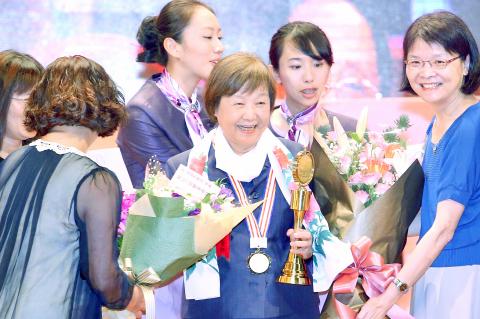Taiwanese should be considered ethnically distinct from Han Chinese, as a majority are more closely related to Aboriginal Austronesians and Pacific islanders, Taiwan’s leading hematologist and medical anthropology researcher said on Saturday.
Marie Lin (林媽利) made the comment at a book launch party for her biography, where colleagues and friends presented her with bouquets and a birthday cake to mark her turning 80 this year.
Decades of research using molecular technology to analyze human DNA and genetic markers had convinced her that most Taiwanese, as descendants of lowland Pingpu Aborigines (平埔族群) and highland Aborigines have mixed blood types, and are quite distinct from the genetic characteristics of the two main ethnic groups in China, the northern and southern Han Chinese.

Photo: CNA
Lin is internationally renowned for her pioneering genetic mapping and ethno-demographic studies of Taiwan’s population, with more than 150 papers to her credit.
“The main Hoklo Taiwanese and Hakka population in this nation have Pingpu and Aboriginal bloodlines in their ancestry from centuries of intermarriage, and the analysis of DNA and genetic markers reflects this new understanding of the close relationship between Taiwanese and Austronesians and Pacific islanders,” she said.
“Through the long history of ethno-cultural evolution on Taiwan, which was isolated from other main population centers, we can consider the result as forming a ‘Taiwanese people group,’ which is distinct from the Han Chinese people,” she said.
Genetic contributions from the Pingpu and Aboriginal bloodlines gave Taiwanese the traits of adventurous ambition, open hospitality to outsiders and a positive, sunny disposition in general, she said.
Lin has served as director of transfusion medicine and molecular anthropology at Mackay Memorial Hospital in Taipei — where she set up the nation’s first blood bank — since 2000, and been a professor at National Taiwan University’s Institute of Forensic Medicine since 2004.

An essay competition jointly organized by a local writing society and a publisher affiliated with the Chinese Communist Party (CCP) might have contravened the Act Governing Relations Between the People of the Taiwan Area and the Mainland Area (臺灣地區與大陸地區人民關係條例), the Mainland Affairs Council (MAC) said on Thursday. “In this case, the partner organization is clearly an agency under the CCP’s Fujian Provincial Committee,” MAC Deputy Minister and spokesperson Liang Wen-chieh (梁文傑) said at a news briefing in Taipei. “It also involves bringing Taiwanese students to China with all-expenses-paid arrangements to attend award ceremonies and camps,” Liang said. Those two “characteristics” are typically sufficient

A magnitude 5.9 earthquake that struck about 33km off the coast of Hualien City was the "main shock" in a series of quakes in the area, with aftershocks expected over the next three days, the Central Weather Administration (CWA) said yesterday. Prior to the magnitude 5.9 quake shaking most of Taiwan at 6:53pm yesterday, six other earthquakes stronger than a magnitude of 4, starting with a magnitude 5.5 quake at 6:09pm, occurred in the area. CWA Seismological Center Director Wu Chien-fu (吳健富) confirmed that the quakes were all part of the same series and that the magnitude 5.5 temblor was

The brilliant blue waters, thick foliage and bucolic atmosphere on this seemingly idyllic archipelago deep in the Pacific Ocean belie the key role it now plays in a titanic geopolitical struggle. Palau is again on the front line as China, and the US and its allies prepare their forces in an intensifying contest for control over the Asia-Pacific region. The democratic nation of just 17,000 people hosts US-controlled airstrips and soon-to-be-completed radar installations that the US military describes as “critical” to monitoring vast swathes of water and airspace. It is also a key piece of the second island chain, a string of

The Central Weather Administration has issued a heat alert for southeastern Taiwan, warning of temperatures as high as 36°C today, while alerting some coastal areas of strong winds later in the day. Kaohsiung’s Neimen District (內門) and Pingtung County’s Neipu Township (內埔) are under an orange heat alert, which warns of temperatures as high as 36°C for three consecutive days, the CWA said, citing southwest winds. The heat would also extend to Tainan’s Nansi (楠西) and Yujing (玉井) districts, as well as Pingtung’s Gaoshu (高樹), Yanpu (鹽埔) and Majia (瑪家) townships, it said, forecasting highs of up to 36°C in those areas